Gender Talk: Surprising with the psychology of high school students
March 26, 2019
Gender Talk #2 is an academic activity on Gender and Gender Equality of the Department of Liberal Education, Faculty of Social Sciences, Hoa Sen University that was held for the second time on March 14, 2019. Gender Talk #2 has attracted the participation of students from Hoa Sen University, Ho Chi Minh City Open University, educators, psychologists, NGOs, and individuals interested in gender equality and education. sex education.
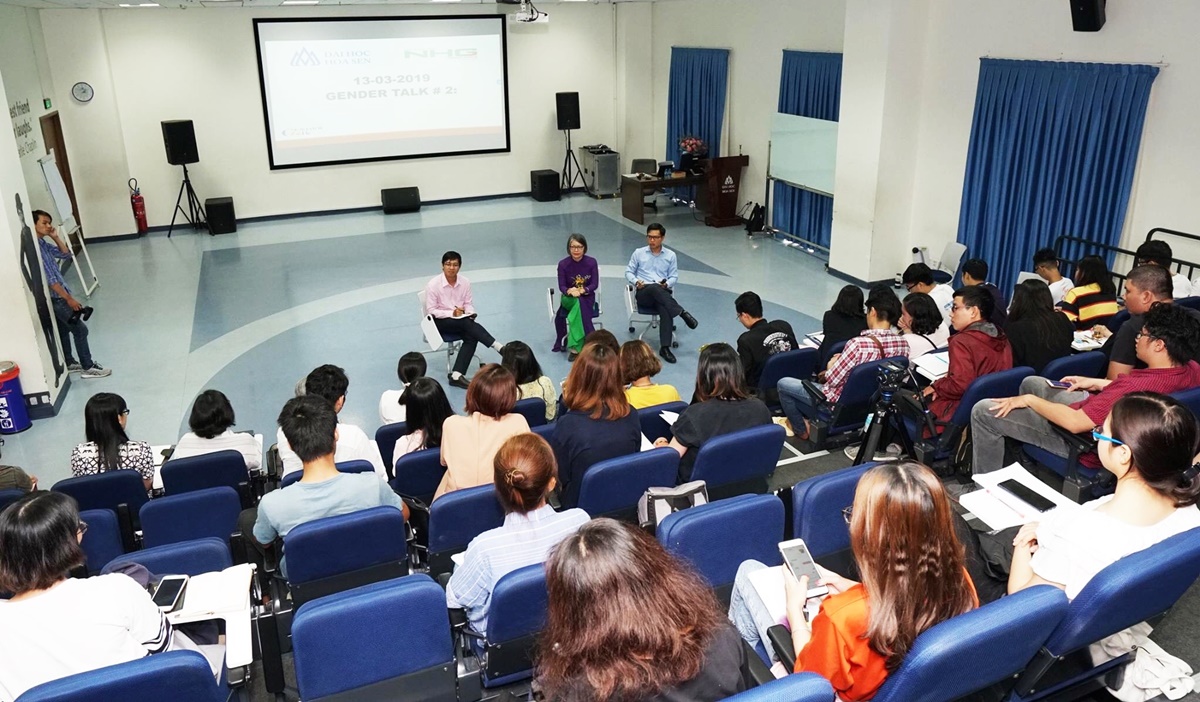
Gender Talk is an academic activity on Gender and Gender Equality of the Department of Liberal Education, Faculty of Social Sciences, Hoa Sen University.
Gender Talk #2 focuses on sharing two topics:
Topic 1: Women’s status in Le Trieu penal law presented by Mr. Do Hong Quan – lecturer at the Faculty of Social Affairs-Social Work-DNAH, Ho Chi Minh City Open University.
Topic 2: Gender psychology for high school students presented by Mr. Pham Hai Lam – psychological counseling specialist and founder of CERM – A place that provides psychological counseling services for students.
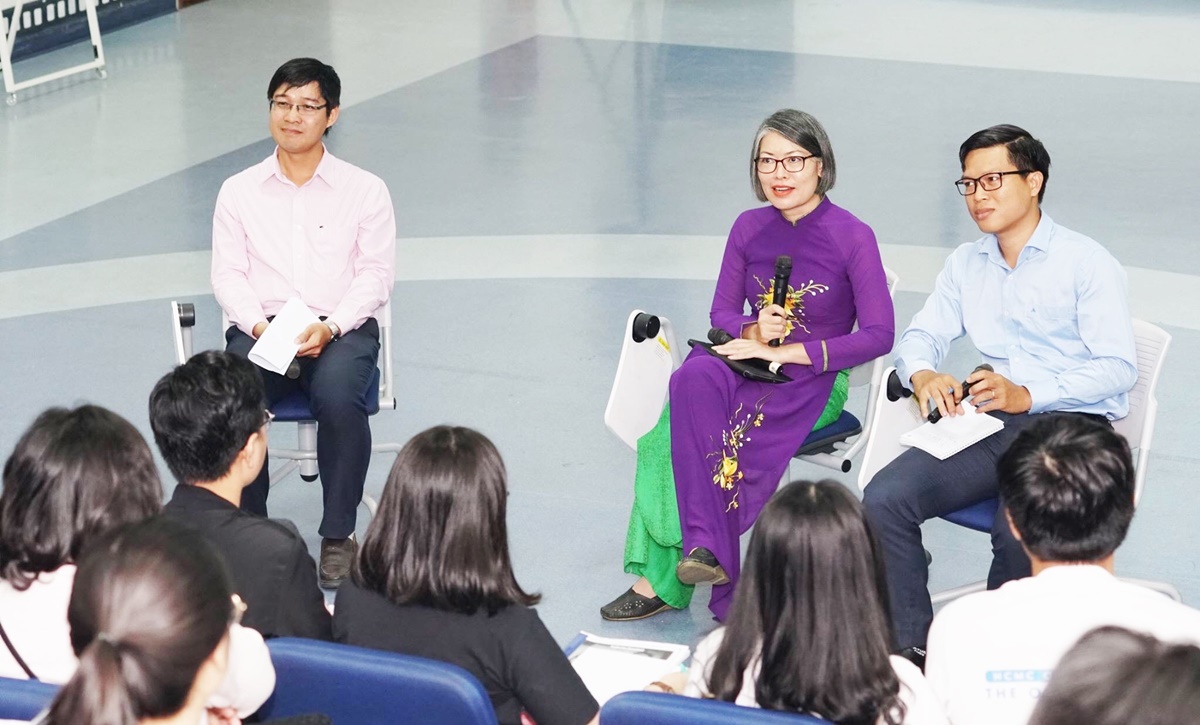
Left to right: Mr. Pham Hai Lam, Ms. Doan Thi Ngoc – Lecturer of the Faculty of Social Sciences at Hoa Sen University and Mr. Do Hong Quan.
Women’s status in Le Trieu criminal law
According to Mr. Do Hong Quan, he chose the topic “Women’s position in Le Trieu penal law” to continue the knowledge of Gender Talk #1 and to extract information from the doctoral thesis of Insun Yu University. Michigan, USA on “Vietnamese Law and Society” in the 17th-18th centuries. According to Mr. Quan, provisions on marriage and family occupy a relatively large position in the Le Dynasty Penal Law and it was born in the context of Confucianism having a profound influence in society. At that time, the social order was based on Confucian law: Three principles-five were usually for men, three obediences-four virtues were for women.
Regarding the structure of the Vietnamese feudal family, two types exist in parallel, the Chinese-style family – representing the absolute authority of the father and the husband. In Vietnamese-style families, the wife is truly equal to the husband and individuality is emphasized. This is shown through the independent ownership of property between parents and children. Besides, married children can be independent or live on their own while their parents are still alive. Allowing children to live on their own directly goes against the highly promoted Confucian family ethics, which requires children to absolutely obey their parents and to sacrifice themselves to take care of their parents in Chinese culture. Quoc (Yu, pp. 13 & 94-95).
Regarding the right to divorce, the husband has the right to divorce due to the wife’s fault such as: The wife commits a crime, has no children, is jealous, evil, lascivious, does not respect her parents, is talkative, and steals (Article 310). . The wife also has the right to divorce her husband due to the husband’s fault, including: The husband is separated from his wife and does not come back for five months (then the wife is allowed to present it to the local official, the local official will testify, then the husband will lose his wife” or “if the children If the son-in-law scolds his wife’s parents because of an unreasonable matter, the judge will grant a divorce” (Articles 308, 333).
Regarding the right to worship ancestors and incense, girls are never excluded from continuing the family line. The law stipulates: “When parents die without leaving a will, the property is divided into 20 parts. Then, 1/20 of the property is taken to worship ancestors, the remainder is divided equally among the children regardless of gender (Article 388). “If a person has an eldest son, he will use it for his eldest son. If he does not have an eldest son, he will use his eldest daughter. The land and incense will be taken 1/20” (Article 391). This is completely different from traditional Chinese society, where girls are often excluded from inheriting wealth.
Regarding property division during divorce, whose personal property does he or she keep? Common property is divided in half: 50% (living people); 50% (deceased). The wife still has the right to own 50% of the property if the husband dies first. When she gets married, the bond between a daughter and her birth family is not lost. When the wife unfortunately dies, their property is still transferred to their parents’ family to use as incense for worship, and when they divorce, they return to their parents’ house. Insun Yu (1990) concluded that this is completely different for Chinese women.
In short, the speaker concluded that the structure of the Vietnamese system has its own customary laws that are not as strict with women as in China and that this was demonstrated at least during the Le Dynasty or based on the Penal Code of the Le Dynasty. This shows that this Code is the creativity and progress of Vietnamese lawmakers to protect and recognize the role, rights, and position of women in society compared to men in feudal society. .
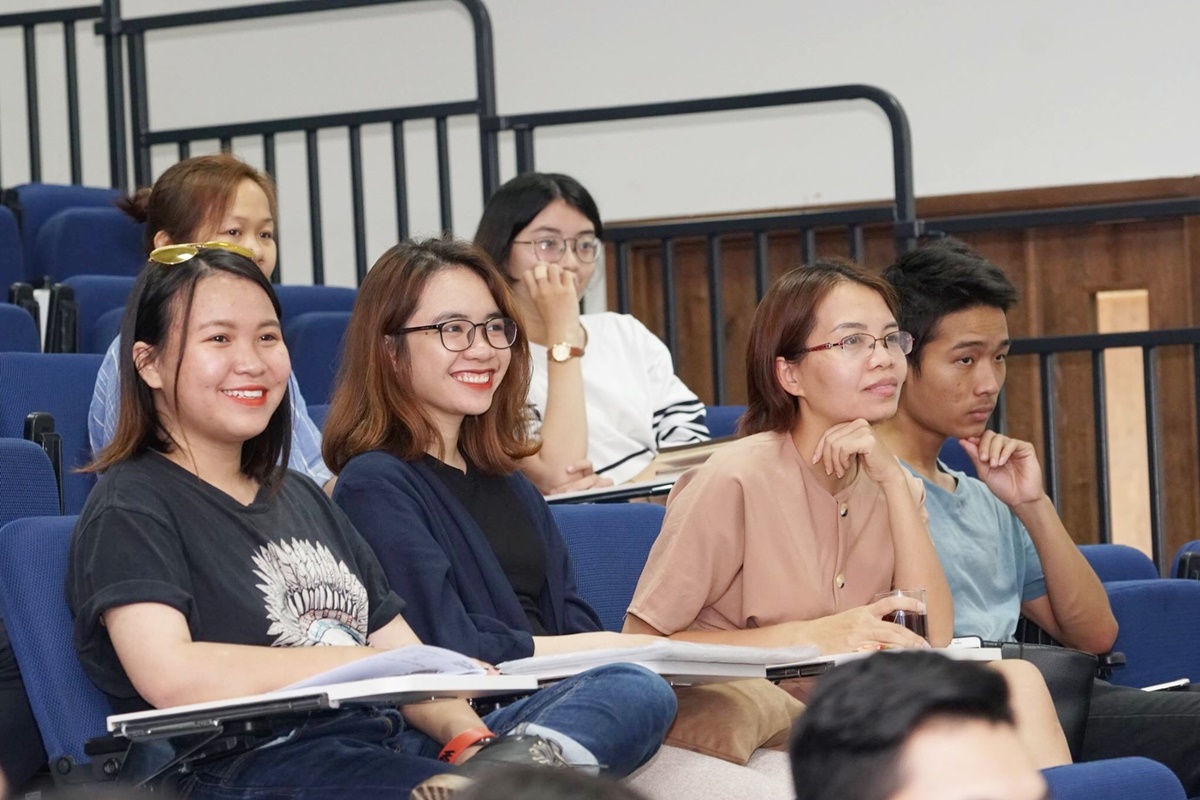
Gender Talk #2 attracts students to enthusiastically participate.
Gender psychology for high school students
On the second topic, Mr. Pham Hai Lam shared that he works on psychological counseling and career guidance for students. When talking to them, we often touch on many issues, but in the end we also touch on the issue of “couple relations” or “sex”. In addition to work problems, Mr. Lam also worries about his role as a husband, father and about sex education for his daughter. Therefore, his presentation leans towards practical applications or towards clinical from a psychological perspective.
It started with a game to ask the audience for their opinions on sex education for high school students. He invited the audience to participate in arranging crosswords about “dual relationships, about ” sex”. Some viewers have arranged the crossword order as follows:
- One student said that today students will “Like each other – learn about each other – fall in love – get married”.
- A student has a different opinion: students will “learn-get-to-know-like-love-it-get”
- In fact, Mr. Lam believes that high school students will arrange it as follows: “he-gets to know-like-gets acquainted-not sure if he will love or marry” or not.
Finally, this sharing article will revolve around questions such as what content about sex do we need to educate high school students about? How do high school students receive sex education? Who educates them about sex?
general discussion
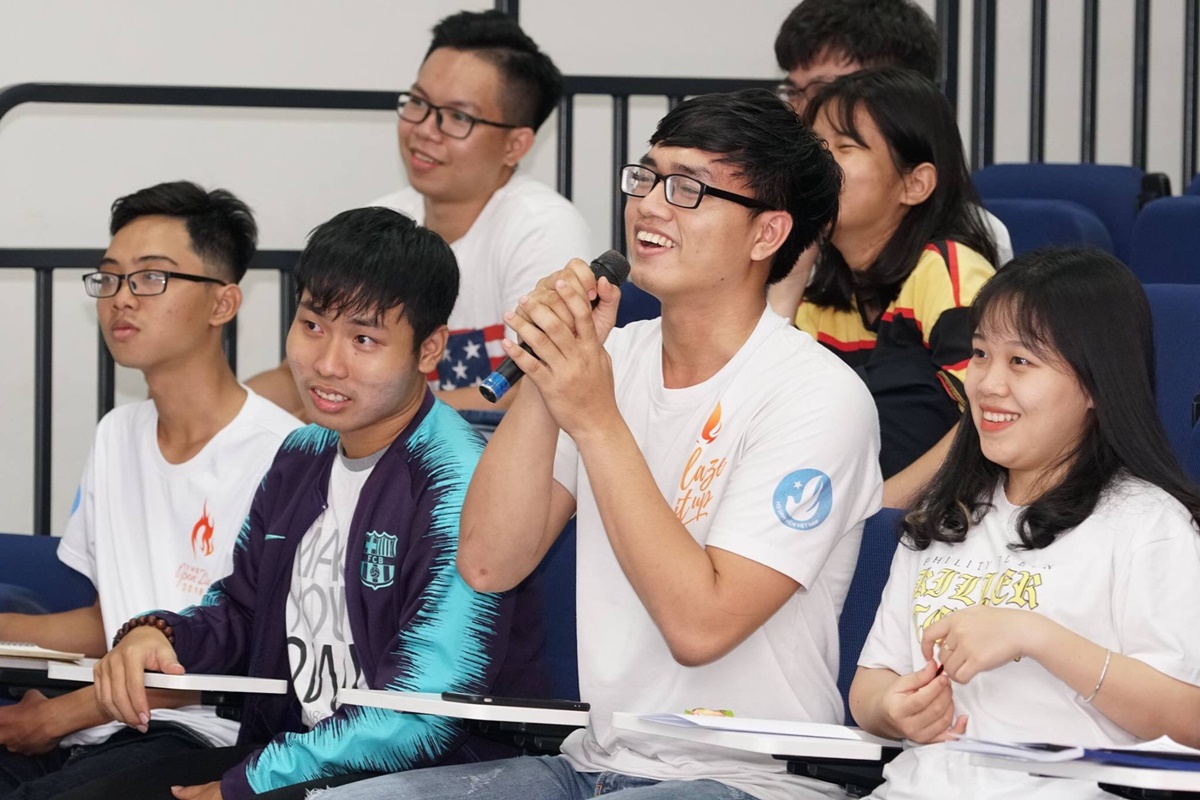
The participating audience asked many questions about the Ministry of Le Trieu Penal Law and knowledge about sex education in families and schools. In addition, the audience also actively shares the programs that the organizations are doing. A non-governmental organization Room To Read shared that it has a full sex education program for girls in provinces and remote areas. This sex education program teaches both sex education and life skills for girls. Most of the audience agreed that the family would be the best place for sex education for children. However, in reality, parents rarely educate their children about sex or are afraid to educate their children about sex or do not know how to teach sex education to their children. Children are also afraid to ask their parents about sexual issues, or if they ask, parents say “the older child will know” or “the child doesn’t know what to ask”.
The question for the audience is whether parents should teach sex education to their children? Or do parents have enough knowledge about sex to teach their children? The audience further shared that in addition to family, school is also a good place to provide continuous sex education for children to help them understand and make the right decisions. Some organizations and audiences also worry that if schools do not teach continuously, it will be ineffective or if parents do not have enough knowledge, it will also lead to an imbalance in sex education. Finally, parents’ acceptance of their children learning sex education at school is also a big challenge because they do not share the same opinion and some of them think that they “draw a line for the deer to run.”
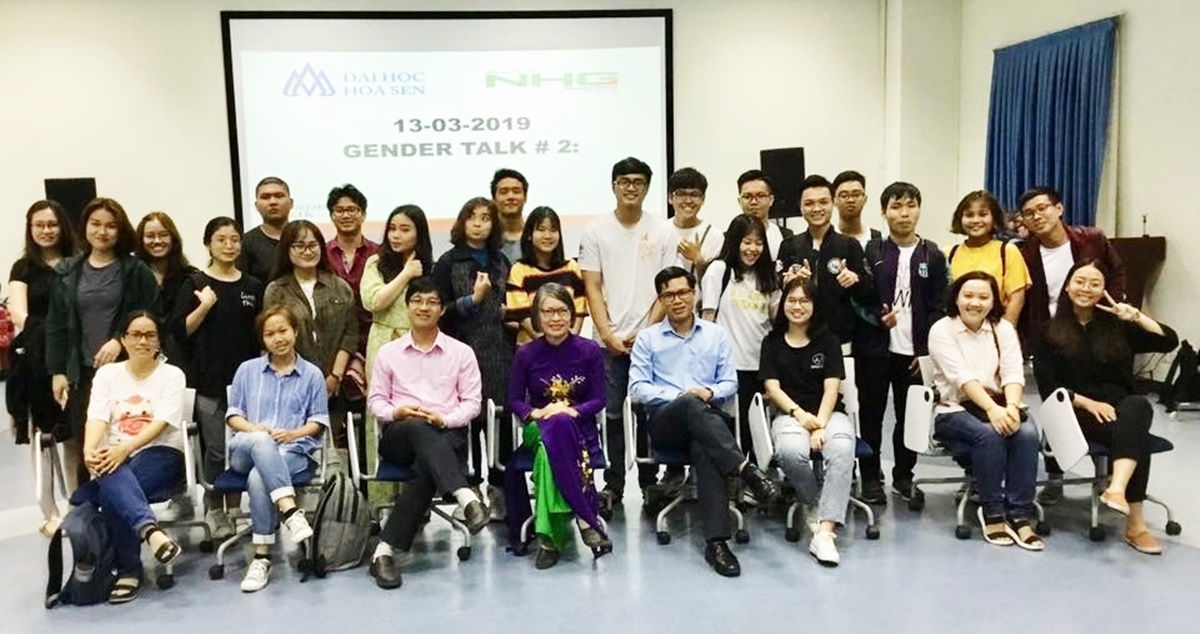
Gender Talk speakers took souvenir photos with students and attendees.
Some feedback from Hoa Sen University students and the audience about Gender Talk #2
#1:I am Thai Ho Thien Thanh from Luong Van Can Fund. I would like to thank the two speakers today for bringing up topics that are not new but have given everyone the opportunity to reflect and criticize, as well as share their stories.
In addition, of course thank you to those who created Gender talk, especially Ms. Ngoc. Thanh loved every moment of the program: listening to the speakers, listening to her friends, and sharing her own story. Just as you mentioned this afternoon, Gender talk is not a simple classroom but a place where people can learn from each other, to know that we have many ways to choose how to behave in related issues. to Gender and Gender Equality.
There is one thing that Thanh has not yet shared with those of you who are currently direct or indirect victims of issues related to Gender and Gender Equality right in your own family at this afternoon’s program: in addition to Change yourself to behave better in the present and the future. Please love those close to you who have hurt you because of (seemingly) bad behavior. Love them because they do not have the conditions or opportunities to learn or access the right way to behave due to education or social circumstances, believe that they have done the best with their understanding. Only then can you approach life with a gentle mind and be confident in your way of life in the future.
#2: Audience member Ngoc Tram, a 2nd year student majoring in Sociology at the Open University shared: On March 14, I participated in a talk about Gender, this is a topic that I am always interested in and monitor. Thanks to the conversation, I realized a mistake in my thinking up until now. That is, always thinking that things like “embroidering and sewing” are trivial, and if they are for women, they are unequal; Through what you and your friends shared, you helped me understand that these things are not trivial but necessary for the girls themselves and those around them. The image of a woman sewing does not show inequality, it is only inequality when society believes that sewing is for women only, not for men. The talk helped me have a more specific view on Gender, helping me clarify issues that I still have questions about.
The talk about Gender is really useful and necessary for a society where the issue of gender equality is a top priority. The program has added knowledge to help people view Gender correctly. I hope to participate in many more conversations on this topic. I sincerely thank you and the two teachers for your extremely sincere and useful sharing.
#3: An audience member named Tuyen shared: “Thank you Ms. Ngoc for organizing a very useful talk. Even though I am old, I enjoyed it very much when attending an event filled with the progressive spirit of students. We look forward to attending more events like this to update the situation of today’s young generation and share with our children and grandchildren more effectively.
#4: Audience member Nguyen Hanh is currently working at Room To Read Organization: First, I would like to thank the organizers for giving me the opportunity to participate. With a duration of about 2:30, I think the value it brings is huge and meaningful. According to me, there are the following reasons: Create a place for students to have the opportunity to increase their knowledge and have a place to Children share and present their opinions (with a slight increase in public speaking skills). Connect and interact with units working in the same field as Gender topics. The above two reasons alone are enough to express the meaning and value of this activity. I think this activity should be maintained and organized periodically. And there needs to be a strategy to attract more students and units to participate so that Knowledge can spread more.
#5: Luong Minh Kim Phung – 2nd year student at Ho Chi Minh City Open University. Ho Chi Minh shared: “If you cannot attend Gender Talk #2, it will truly be a shortcoming in your adult life and that of everyone in that room. I really enjoyed going to this seminar, talking about the inequality that still exists somewhere in this life. I think inequality cannot go away, only thanks to each individual, including me, who is aware of how harmful it is, can at least reduce that inequality in life. .
And thanks to your Gender Talk, I can express my feelings, listen to each person’s stories, reflect and draw lessons for the future. And I see that the most important thing is that in the seminar there are many parents, adults, and peers, which creates conditions for the separation between parents and children to understand each other. closer, closer to each other. I really thank Ms. Ngoc for creating this seminar, and I really, really want this seminar to always be strong in the future.
Doan Thi Ngoc – Teacher of Faculty of Social Sciences, Hoa Sen University















